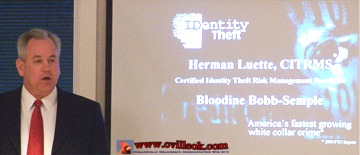



Home
(email questions/comments to wrightted@aol.com).
Ted Wright -- last update 2/1/2007 (ChamberFeb1.html)
www.cvilleok.com
Copyright 2007 -- Collinsville, Oklahoma
|
Collinsville
Chamber of Commerce
Feb. 1, 2007 Identity Theft Laws Unknown To Most |
|
This web site is brought to you by
the Newspaper
Museum In Collinsville and the other advertisers appearing on these
pages. If you would like to provide content or advertisements ...
call Ted Wright (918) 371-1901 or send email to wrightted@aol.com. |
Collinsville Chamber of Commerce members (by show of hands) were mostly surprised by legislation already in effect which makes businesses liable for damages caused by mishandling (or loss) of their customer's private information. Most people are aware of identity theft issues related to credit cards, but the Chamber speaker (Herman Luette, Certified Identity Theft Risk Management Specialist) presented a larger scope of issues. The five major identity theft areas cover: financial data, medical data, character/criminal identity, driver's licence misuse and social security number theft/misure by illegal immigrants.
The cost to individual victims of identity theft (money lost & time spent trying to clear their records) continues to increase. Individuals impacted by identity theft also cost their employers in lost time working thought issues for months during business hours.
FACTA (Fair and Accurate Credit Transactions Act), HIPPA (for medical record restrictions), and the Gramm, Leach, Biley Safeguard Rule were cited as legislation attempting to protect our private information which is used by identity thiefs.

|
Editorial: -- Just my two
cents worth ... |